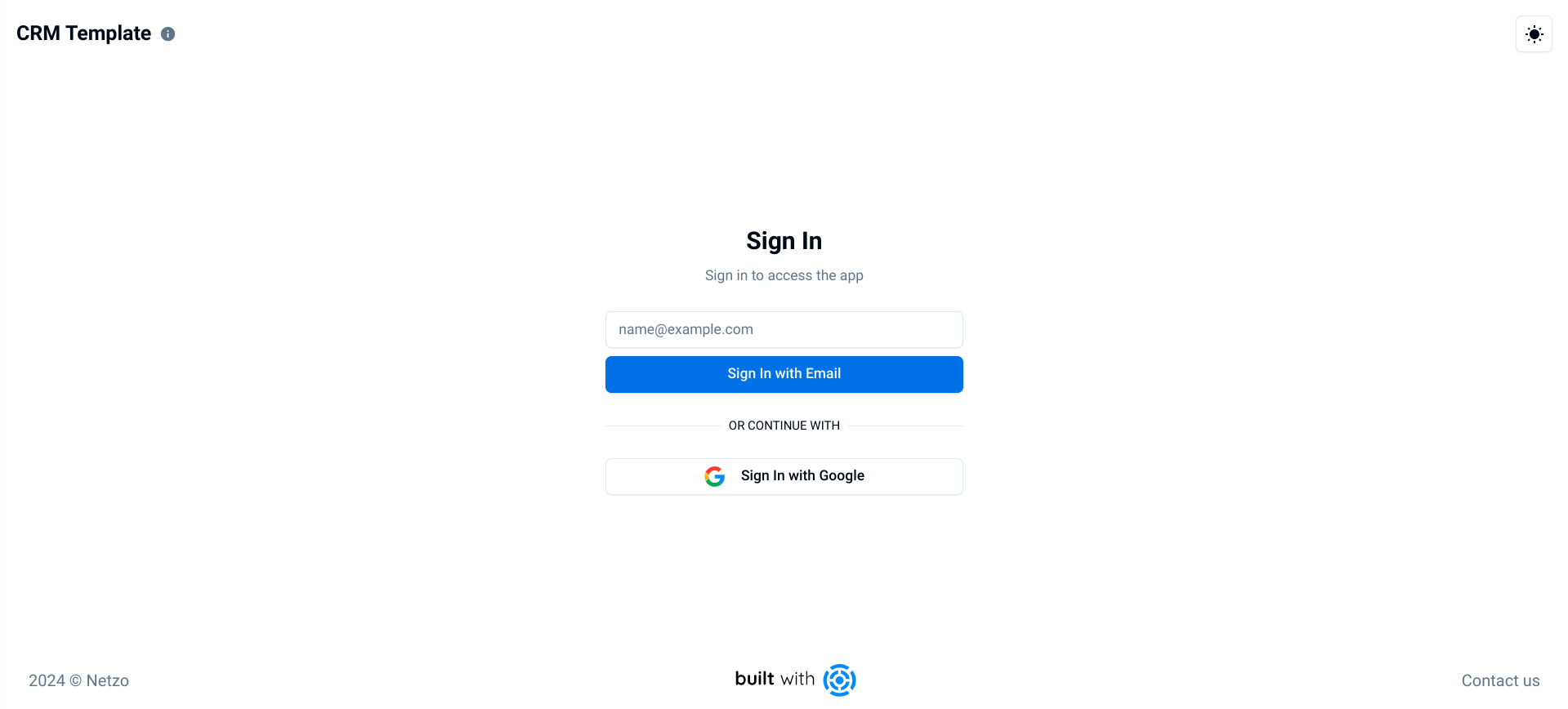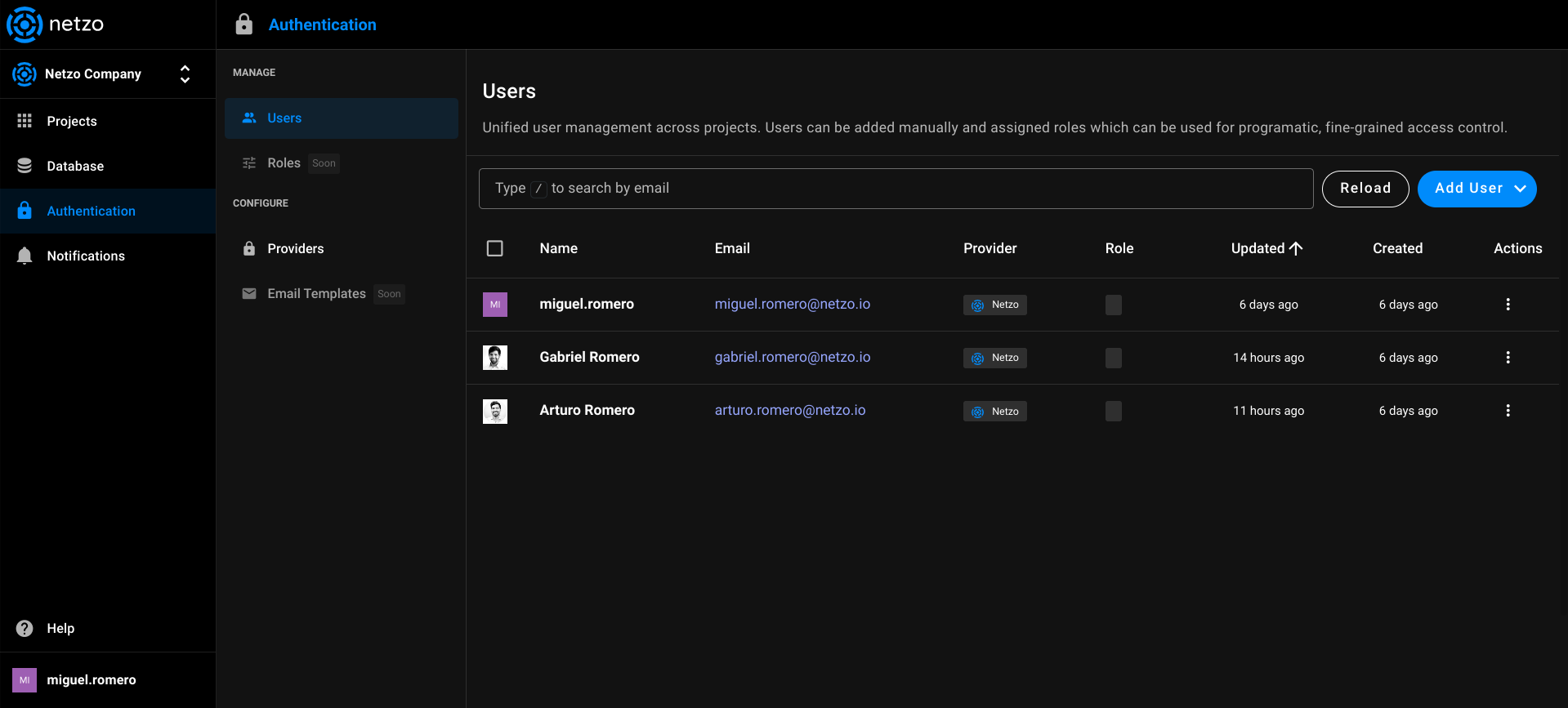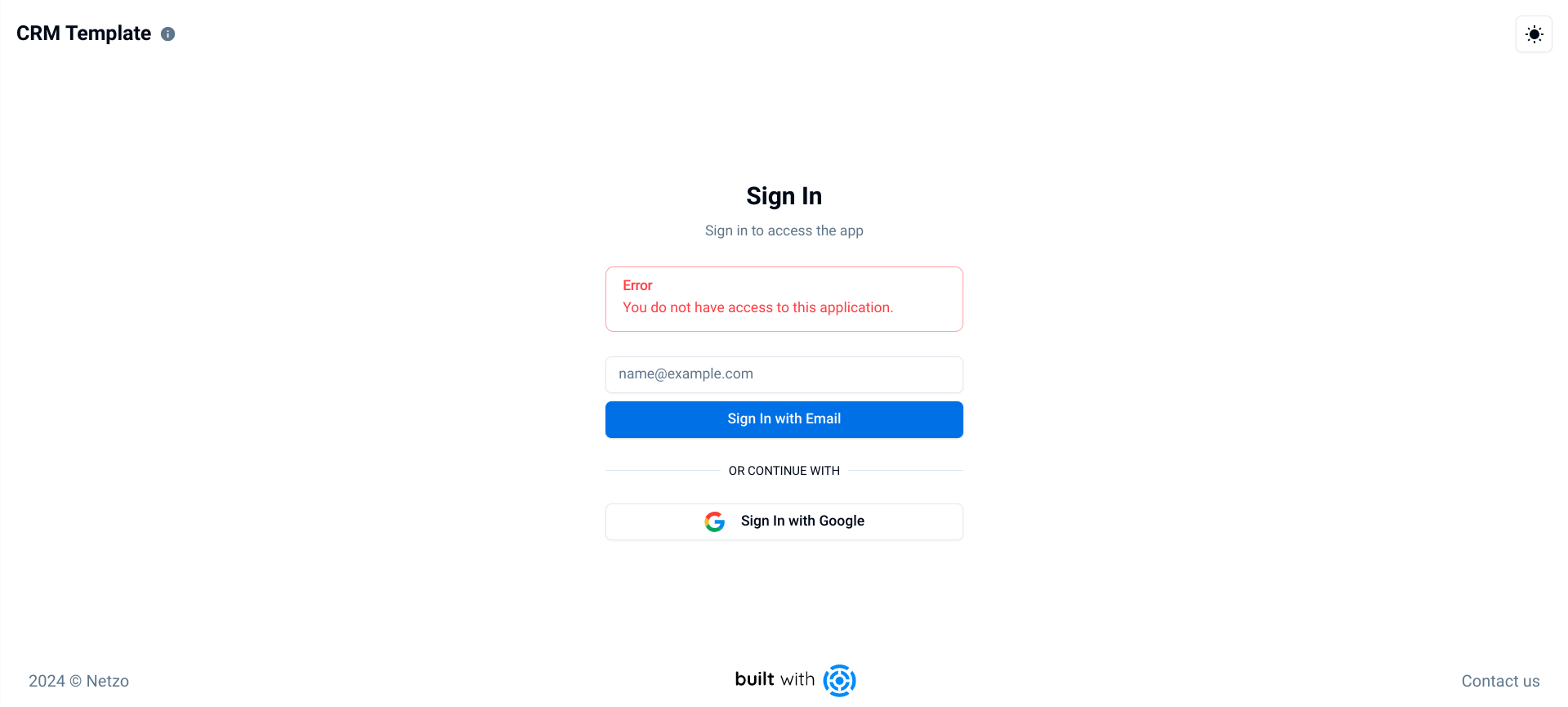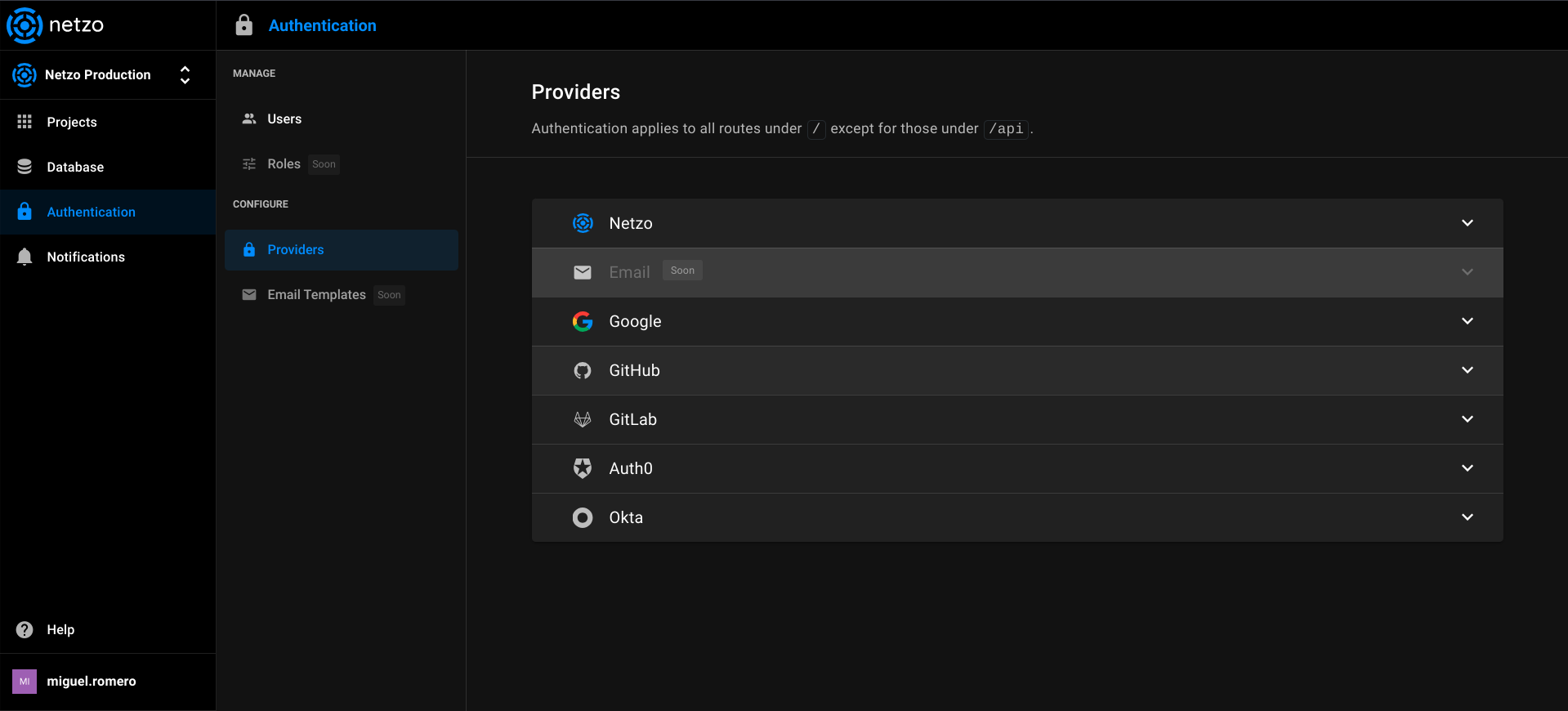Auth
Built-in authentication, user management and role-based access control (RBAC).
The Authentication module is a plug-and-play authentication solution for your application. The module provides unified authentication flows for multiple authentication providers, simple yet flexible user management and role-based access control (RBAC).

When enabling authentication for any of the supported authentication providers, the following routes are added to your application
UI routes: brandable pages mounted at specific routes
/auth- serves the sign-in/up page for users to authenticate to the application.
API routes: endpoints used to handle authentication requests (auth flows)
/auth/{provider}/sign-in- handles sign-in requests (creates new auth session)/auth/{provider}/callback- handles callback requests after sign-ins (internal)/auth/sign-out- handles sign-out requests (clears existing auth session if any)
as well as middlewares to manage sessions, users and handle redirects.
/rest) if it is enabled. Authentication for those routes is handled by the REST module instead.Users
Authentication users are users that can authenticate to the application. Users can be added manually from the Users page, or automatically when a user signs in for the first time (provided that new registrations/sign-ups are enabled).
All active and inactive authentication users are listed in the Users page. Here, you can manage users and their roles. The role will determine the permissions each user has within the application, but this logic is to be implemented for each application as required via the helpers netzo provides.

Usage
Registration
Configure the app in a netzo.config.ts configuration file as shown below.
import { defineConfig } from "netzo/mod.ts";
import * as netzo from "netzo/plugins/mod.ts";
export default defineConfig({
plugins: [
netzo.auth({
title: "Sign In",
description: "Sign in to access the app",
caption: 'By signing in you agree to the <a href="/" target="_blank">Terms of Service</a>',
providers: { /* refer to each individual provider */ }
})
],
});
development set the auth property to undefined as shown below.export const netzo = await Netzo({
auth: Deno.env.get("DENO_REGION") ? { providers: { /* ... */ } } : undefined,
});
Configuration
import type { OAuth2ClientConfig } from "https://deno.land/x/oauth2_client/mod.ts?s=OAuth2ClientConfig";
type AuthConfig = {
/* Title shown above the sign-in/sign-up form */
title?: string;
/* Description shown above the sign-in/sign-up form */
description?: string;
/* Caption shown below the sign-in/sign-up form (useful for linking policies) */
caption?: string;
/* Configuration for each provider (at least one is required to enable module) */
providers: {
netzo?: NetzoClientConfig;
email?: EmailClientConfig;
google?: OAuth2ClientConfig;
github?: OAuth2ClientConfig;
gitlab?: OAuth2ClientConfig;
auth0?: OAuth2ClientConfig;
okta?: OAuth2ClientConfig;
};
};
Environment Variables
To ease development, the Authentication module will attempt to load configuration defaults for each provider from environment variables. Replace the PROVIDER prefix with your given OAuth provider's name when starting your server. E.g. GOOGLE, GITHUB or AUTH0.
PROVIDER_CLIENT_ID- Client ID of a given OAuth application.PROVIDER_CLIENT_SECRET- Client secret of a given OAuth application.PROVIDER_DOMAIN(optional) - Server domain of a given OAuth application. Only required for Okta and Auth0.
--allow-env[=<VARIABLE_NAME>...] permission flag. Netzo sets the required permissions already via the default start task, so you don't need to worry about it when running with deno task start.State
Authentication state like current session and user information is available via ctx.state.auth. Note that the authentication state can only be accessed via ctx: RouteContext in (server-side) routes. For usage in components or islands (client-side) you can pass results down as props.
import { defineRoute } from "$fresh/server.ts";
import type { NetzoState } from 'netzo/mod.ts'
export default defineRoute<NetzoState>(async (req, ctx) => {
const { sessionId, sessionUser } = ctx.state?.auth ?? {};
const mustAuth = !!ctx.state?.auth && !sessionId;
if (mustAuth) Response.redirect("/auth");
return (
<div>
<h1>Welcome, {sessionUser.name}</h1>
<a href="/auth/signout">Sign Out</a>
</div>
);
});
Errors
The Authentication module automatically handles errors and redirects during the authentication process. Redirecting to /auth?error=... ` will automatically display for the user to see. This is useful in case you need to handle authentication errors manually.
For instance, the /auth?error=You do not have access to this application will render the following error page:

Advanced
This module is meant to provide the most essential authentication features in a simple and easy to use bundle. If you need more advanced features, you can always implement your own authentication including integrating with popular authentication libraries and services.
Providers
Authentication providers is how users can authenticate to the application. Multiple authentication providers can be configured for the application in the netzo.config.ts configuration file as shown below.

Netzo
import { defineConfig } from "netzo/mod.ts";
import * as netzo from "netzo/plugins/mod.ts";
export default defineConfig({
plugins: [
netzo.auth({
providers: {
netzo: {}
}
})
],
});
Email
Coming soon...
Google
import { defineConfig } from "netzo/mod.ts";
import * as netzo from "netzo/plugins/mod.ts";
export default defineConfig({
plugins: [
netzo.auth({
providers: {
google: {
clientId: Deno.env.get('GOOGLE_CLIENT_ID')!,
clientSecret: Deno.env.get('GOOGLE_CLIENT_SECRET')!,
}
}
})
],
});
GitHub
import { defineConfig } from "netzo/mod.ts";
import * as netzo from "netzo/plugins/mod.ts";
export default defineConfig({
plugins: [
netzo.auth({
providers: {
github: {
clientId: Deno.env.get('GITHUB_CLIENT_ID')!,
clientSecret: Deno.env.get('GITHUB_CLIENT_SECRET')!,
}
}
})
],
});
GitLab
import { defineConfig } from "netzo/mod.ts";
import * as netzo from "netzo/plugins/mod.ts";
export default defineConfig({
plugins: [
netzo.auth({
providers: {
gitlab: {
clientId: Deno.env.get('GITLAB_CLIENT_ID')!,
clientSecret: Deno.env.get('GITLAB_CLIENT_SECRET')!,
}
}
})
],
});
Slack
import { defineConfig } from "netzo/mod.ts";
import * as netzo from "netzo/plugins/mod.ts";
export default defineConfig({
plugins: [
netzo.auth({
providers: {
slack: {
clientId: Deno.env.get('SLACK_CLIENT_ID')!,
clientSecret: Deno.env.get('SLACK_CLIENT_SECRET')!,
}
}
})
],
});
Auth0
import { defineConfig } from "netzo/mod.ts";
import * as netzo from "netzo/plugins/mod.ts";
export default defineConfig({
plugins: [
netzo.auth({
providers: {
auth0: {
clientId: Deno.env.get('AUTH0_CLIENT_ID')!,s
clientSecret: Deno.env.get('AUTH0_CLIENT_SECRET')!,
domain: Deno.env.get('AUTH0_DOMAIN')!
}
}
})
],
});
Okta
import { defineConfig } from "netzo/mod.ts";
import * as netzo from "netzo/plugins/mod.ts";
export default defineConfig({
plugins: [
netzo.auth({
providers: {
okta: {
clientId: Deno.env.get('OKTA_CLIENT_ID')!,
clientSecret: Deno.env.get('OKTA_CLIENT_SECRET')!,
domain: Deno.env.get('OKTA_DOMAIN')!
}
}
})
],
});